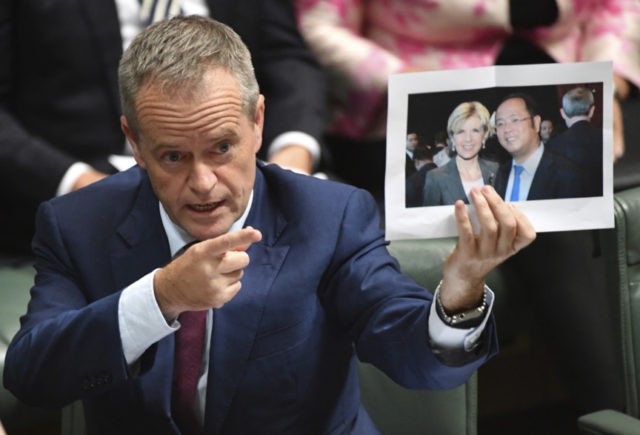Australian media reported on Wednesday that businessman Huang Xiangmo has been effectively expelled from the country. Xiangmo was a permanent resident who applied for citizenship, but now he does not even have an Australian passport.
He is a key figure in the scandal over Chinese influence on Australian politics that brought down rising Labor star Sam Dastyari in 2017.
Huang Xiangmo is a billionaire real-estate developer who moved to Sydney in 2011, settling into a $13 million mansion that he might never see again. He soon began making large donations to Australian politicians, ultimately donating about $2.7 million in concert with his associates and corporate holdings.
Huang’s money opened a lot of doors. In 2013, Trade Minister Andrew Robb hailed him as a “visionary” and “man of many dimensions” with whom Robb had enjoyed “many interesting conversations” on an “endless range of topics.”
A great many of those topics concerned Australia’s relationship with China. Huang donated $1.8 million to establish the Australia China Relations Institute (ACRI) at the University of Technology Sydney and personally selected former foreign minister Bob Carr to direct it. Huang later became chairman of the Australian Council for the Promotion of the Peaceful Reunification of China, a purportedly apolitical NGO later identified as a front for a Chinese Communist Party agency that specializes in persuading foreign governments to see things Beijing’s way.
Australia’s awakening to the extent of Chinese Communist influence received a very loud wake-up call in 2016 when Dastyari, a key player in the cash pipeline from Huang to Australian politicians, was caught parroting Beijing’s talking points on the South China Sea.
A string of revelations about the extent of Huang’s influence upon Dastyari followed, including charges of improper payments on Dastyari’s behalf made by Chinese donors. The last straw was broken when Dastyari warned Huang that he might be under surveillance by Australian intelligence and gave him tips for evading the national security agency, ASIO. Unfortunately for Dastyari, Huang evidently was under surveillance at the time he gave his helpful advice.
Dastyari, once seen as one of Australia’s most promising young politicians, resigned from the Senate in December 2017. The ASIO continued building its case against Huang, whose profile became much lower after Dastyari resigned.
Huang’s allies and foundations pushed back against all allegations as mere Sinophobia, but politicians stopped returning his calls and began treating his donation checks as radioactive. The cancellation of his residency and passport came after two years of investigative work by the ASIO while Huang’s application for citizenship was under consideration.
The high-flying businessman was out of the country – in Beijing, according to some reports – when he learned he would not be allowed to return. According to Australia’s ABC News, the government made the decision months ago but only announced it to the public today. Australia must now deal with the troublesome detail that Huang owns about a billion dollars’ worth of its soil.
“Huang has fallen from being a ‘visionary’ and a favored donor to being stranded offshore, blocked from returning to his Sydney mansion, his multi-million dollar business, and his wife and children,” the Sydney Morning Herald wrote on Wednesday. “It’s perhaps the most powerful signal yet to Beijing from Canberra that Australia is serious about countering efforts to interfere in our politics.”
Australian Foreign Minister Marise Payne suggested the action against Huang would not be a major problem for relations between Canberra and Beijing, but analysts quoted by the South China Morning Post on Wednesday predicted Huang was only the first of several rich and influential Chinese businessmen who might find their access to Australia curtailed or canceled in the months to come.

COMMENTS
Please let us know if you're having issues with commenting.